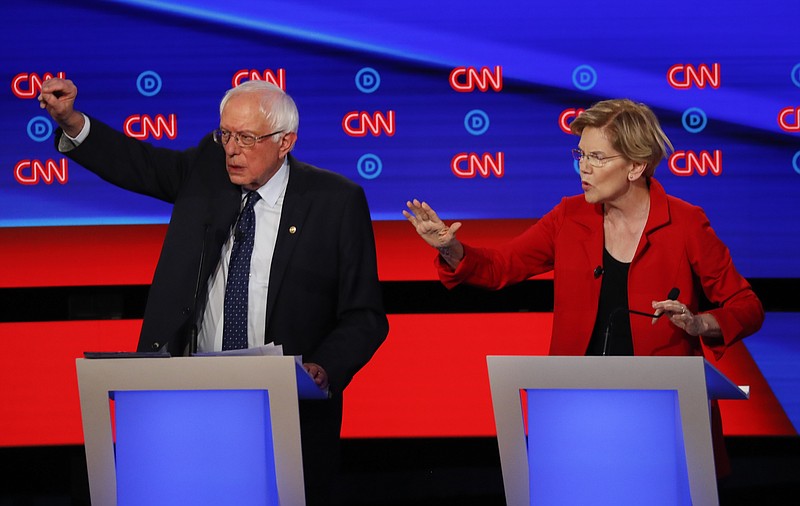Between the first and second round of Democratic presidential primary debates this summer, some of the nearly two dozen candidates evidently heard a little bit from the voters they'll have to attract to win the 2020 election.
An open border is not anything voters will support, and they aren't interested in being told they will have to give up their health insurance if they don't want to.
So the candidates repackaged their terms and talking points and tried to fuzz up their answers in Wednesday's and Thursday's gabfests in Detroit. Voters, we trust, are too smart for that.
Some previous open border candidates now say they would "decriminalize" border crossings or make them a "civil" matter. In other words, coming into the country illegally would still be wrong. We just wouldn't do anything about it or would give offenders a slap on the wrist. And the lawbreakers soon would be on their way to the interior of the country.
Of course, that would only encourage more people to come, and the candidates know that.
The concept of Medicare for All, especially on the second night of the debates, was papered over with the phrase "universal health care." Voters have heard the $30 trillion-$40 trillion price tag laid on the former term, though, and are naturally wary. But, make no mistake, every candidate on the stage on both nights, in the end, wants health care run by the federal government. If they can get there by saying "public option" or allowing Americans to keep their private plan for a short time, they'll go that route.
Typical was a response by U.S. Sen. Kamala Harris, D-California, who seems determined to come off as the brainy school kid with all the answers who infuriatingly insists on talking over her classmates.
Asked about her health care plan "banning employer-based health insurance," she initially said her plan didn't offer anything illegal, which no one had suggested. Instead, U.S. Sen. Michael Bennet, D-Colorado, had said that her plan would make employer-based insurance illegal. No, she suggested, her plan would only "separate the employer from health care, meaning that where you work will not be a where the kind of health care you get will not be a function of where you work."
In other words, Harris's plan would not include employer-based health insurance.
The CNN debate moderators also were happy to help out their political left compatriots. They'd already banned down-the-line answers and hand-raising, which got the candidates in hot water the last time around. But in this round, they let candidates - especially Harris - talk well after their time expired and did not follow up questions they asked that the candidates didn't answer by asking them again.
Neither did they ask their questions again when the candidates suggested answers they didn't want to give were only "Republican talking points." When the candidates used that phrase, you knew they'd heard from voters who were not very happy about where they stood.
On the second night of the debate, it was evident candidates had sharpened their rhetoric for 76-year-old front-runner Joe Biden, the political lifer and former vice president. At some point, Sens. Harris, Cory Booker, D-New Jersey, and Kirsten Gillibrand, D-New York, all attacked, the latter bringing up a 38-year-old op-ed Biden wrote about women working outside the home.
But the former vice president, who was not forceful in repudiating accusations in the first debate and appeared tired, was ready with charges of his own. And while they appeared rehearsed, he nevertheless scored points in bringing up Harris's record as the former attorney general of California and Booker's as the former mayor of Newark, New Jersey. Since they couldn't very well deny the truths presented them, the senators deflected and attempted to change the subject.
Biden, though, often appeared out of steam by quickly ending his answers when his time was up (unlike others on stage), by suggesting President Donald Trump might have "eight more years" and by mixing up a text to support him with a campaign web site.
By the end of night two, it was clear the Democratic Party is still trying to figure itself out. Does it want to go all in for its growing far left wing, risking a potential electoral landslide re-election for Trump, or does it want to nominate someone more moderate, setting up a potential electoral horse race but a nominee not considered woke enough by many in the party?
Former Maryland Congressman John Delaney put the situation in perspective on the first night.
"We can go down the road that Sen. [Bernie] Sanders and Sen. [Elizabeth] Warren want to take us," he said, "which is with bad policies like 'Medicare for all,' free everything, and impossible promises that will turn off independent voters and get Trump re-elected. That's what happened with McGovern [in 1972]. That's what happened with Mondale [in 1984]. That's what happened with Dukakis [in 1988]."
